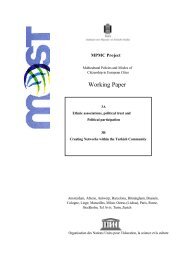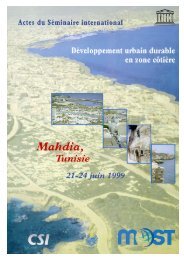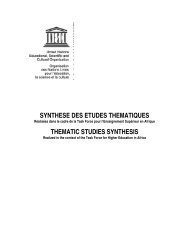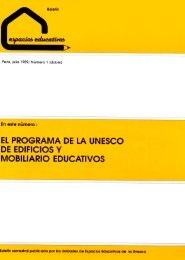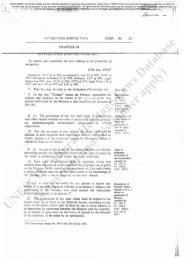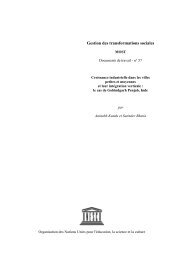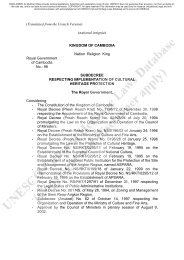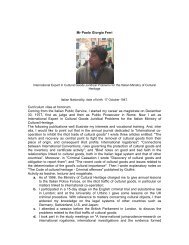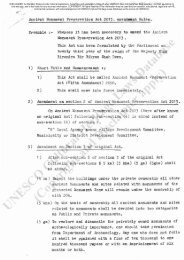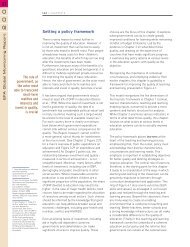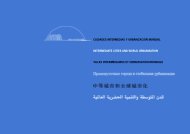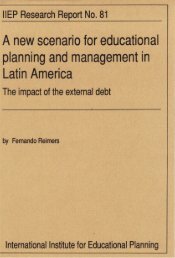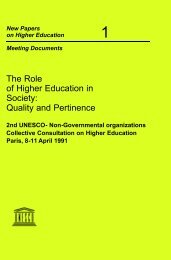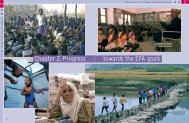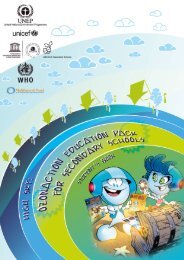NURTURING THE TREASURE NURTURING THE ... - Unesco
NURTURING THE TREASURE NURTURING THE ... - Unesco
NURTURING THE TREASURE NURTURING THE ... - Unesco
You also want an ePaper? Increase the reach of your titles
YUMPU automatically turns print PDFs into web optimized ePapers that Google loves.
<strong>NURTURING</strong> <strong>THE</strong> <strong>TREASURE</strong><br />
■ Goal 2<br />
National EFA plans and overall education and learning policies<br />
and strategies within the framework of a lifelong learning<br />
perspective.<br />
■ Goal 3<br />
A holistic, gender-just and integrated approach to adult and<br />
lifelong learning, valuing informal, non-formal and formal<br />
modes of learning, based on the different needs of the disadvantaged<br />
and marginalized.<br />
■ Goal 4<br />
An intersectoral approach to adult and lifelong learning policies<br />
and practices among governmental, non-governmental,<br />
civil society and international organizations.<br />
■ Goal 5<br />
Effective networks for the cross-fertilization and sharing of<br />
knowledge in the area of lifelong learning within and between<br />
nations, with a special emphasis on least developed countries.<br />
5 UIE’s MEDIUM TERM PROGRAMME<br />
This Medium Term Strategy approach, based on and inspired by<br />
UNESCO’s current Strategic Plan (C/4), will be spelt out in rolling<br />
biennial programme activities and yearly action plans. The present<br />
section outlines the goals and areas of focus. It also shows clusters<br />
of activities but not detailed in a time-bound perspective. The<br />
major partners are listed below and the total budget or yearly budget<br />
is shown as appropriate.<br />
Outcome-based planning is adhered to, in accordance with the<br />
recommendations made in C/4. Similarly, to pave the way for evidence-based<br />
monitoring, broad indicators are outlined. The scope<br />
of these activities in the next six years (2002-2007) is spelt out as<br />
far as possible. A summary is provided in the logical framework<br />
matrix in Section 11.<br />
GOAL 1<br />
A positive environment for the effective and creative exercise<br />
of the right to education and learning by all<br />
AREAS OF ACTION<br />
1.1 Providing technical support and training to promote the<br />
recognition of the right to education and learning.<br />
1.2 Conducting comparative research in the areas of literacy, nonformal<br />
education, adult and lifelong learning policies and<br />
supportive legislation, with emphasis on the learning needs<br />
of disadvantaged and marginalized groups, including genderrelated<br />
exclusion, as well as the factors that promote or hinder<br />
the exercise of those rights.<br />
1.3 Disseminating examples of good practice in the area of policy<br />
development and positive legislation on lifelong learning<br />
through publications and networking.<br />
1.4 Identifying enlarged funding possibilities for lifelong learning.<br />
EXPECTED OUTCOMES<br />
1.5 Literacy, non-formal education, adult and lifelong learning<br />
recognised as valuable components of the right to education<br />
and placed high on policy agendas.<br />
1.6 Support for policy and legislative reforms promoting universal<br />
access to literacy, non-formal education, adult and lifelong<br />
learning.<br />
1.7 Promotion of the right to education and learning of special<br />
groups – adult illiterates, girls and women, people with<br />
HIV/AIDS, older citizens, out-of-school young adults and rural<br />
communities.<br />
1.8 Identification and dissemination at regional and interregional<br />
levels of a knowledge base for drawing up national<br />
lifelong learning policies and legal provisions.<br />
1.9 Increased national funding and community investment in<br />
literacy, non-formal education, adult and lifelong learning.<br />
GOAL 2<br />
National EFA plans and overall education and learning policies<br />
and strategies within the framework of a lifelong learning perspective<br />
AREAS OF ACTION<br />
2.1 Engaging in advocacy work among UNESCO Member States<br />
to encourage them to develop national EFA action plans in the<br />
perspective of lifelong learning, and to have these implemented<br />
and accounted for by 2015. This will include assisting<br />
governments, NGOs, CSOs and other stakeholders to<br />
incorporate principles and recommendations of EFA, the UN<br />
Literacy Decade and the CONFINTEA Agenda for the Future<br />
into their policies and strategies.<br />
2.2 Encouraging UNESCO Member States to incorporate specific<br />
goals in the areas of literacy, non-formal education, adult<br />
and lifelong learning into national EFA action plans, with a<br />
view to these goals being implemented.<br />
2.3 Building capacities in Member States and in civil society organizations<br />
for the implementation of holistic national EFA<br />
action plans in the perspective of lifelong learning, including<br />
literacy, non-formal education and adult learning.<br />
2.4 Monitoring the implementation of the Dakar Framework for<br />
Action in UIE’s areas of expertise (literacy, non-formal education,<br />
adult and lifelong learning) as part of UNESCO’s monitoring<br />
report team.<br />
11



